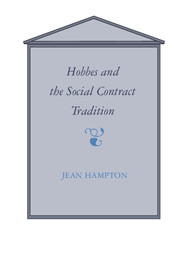Book contents
- Frontmatter
- Contents
- Acknowledgments
- A note on texts and references
- Introduction
- 1 “Of Man”: the foundation of Hobbes's political argument
- 2 What is the cause of conflict in the state of nature?
- 3 The shortsightedness account of conflict and the laws of nature
- 4 The argument for absolute sovereignty
- 5 Authorizing the sovereign
- 6 Hobbes's social contract
- 7 The failure of Hobbes's social contract argument
- 8 Can Hobbes's argument be salvaged?
- 9 How the traditional social contract argument works
- Bibliography
- Index
1 - “Of Man”: the foundation of Hobbes's political argument
Published online by Cambridge University Press: 05 June 2012
- Frontmatter
- Contents
- Acknowledgments
- A note on texts and references
- Introduction
- 1 “Of Man”: the foundation of Hobbes's political argument
- 2 What is the cause of conflict in the state of nature?
- 3 The shortsightedness account of conflict and the laws of nature
- 4 The argument for absolute sovereignty
- 5 Authorizing the sovereign
- 6 Hobbes's social contract
- 7 The failure of Hobbes's social contract argument
- 8 Can Hobbes's argument be salvaged?
- 9 How the traditional social contract argument works
- Bibliography
- Index
Summary
He that is to govern a whole nation, must read in himself, not this or that particular man, but Man-kind.
Hobbes, LeviathanTHE PREMISSES OF HOBBES'S ARGUMENT
Every political philosopher is influenced by the economic, social, and political events of the time, and Hobbes's work was particularly responsive to the political turmoil of his day. He was born in 1588, just before Philip II of Spain sent the Armada to attack England during Spain's war with The Netherlands. During his childhood, a civil war raged within France between Protestant Huguenots and the Catholic crown. The Thirty Years' War ravaged Europe during all of his early adult years, from 1618 to 1648. And England itself was plunged into civil war and disorder from 1642 to 1649. Cromwell waged war against Ireland, Scotland, and Holland during his protectorship, and two other wars between England and The Netherlands erupted in 1665 and 1672. During the 1670s, Holland was also engaged in a war against France, along with Austria, Spain, and the German principalities. And in 1679, the year of Hobbes's death, political turmoil in England was increasing as, once again, opponents of a Stuart king prepared to overthrow him.
Given this kind of violent political turmoil, it is not suprising that a philosopher should come to hold a view of human beings as creatures who will, if unchecked, inevitably behave violently toward one another.
- Type
- Chapter
- Information
- Hobbes and the Social Contract Tradition , pp. 5 - 57Publisher: Cambridge University PressPrint publication year: 1987



